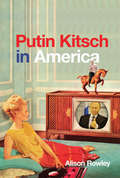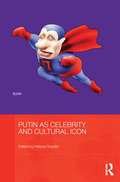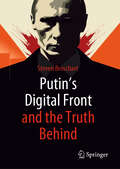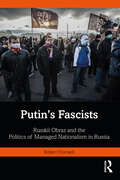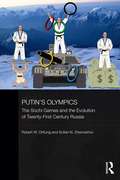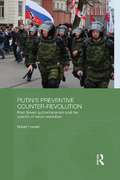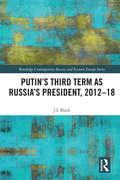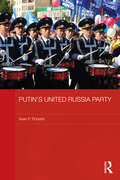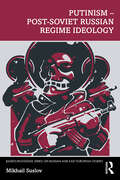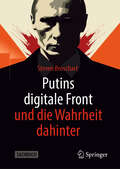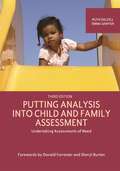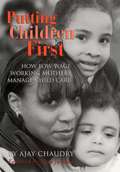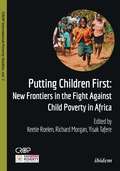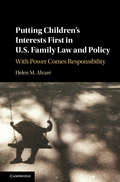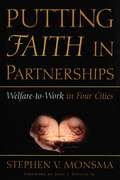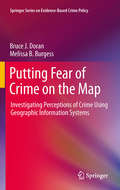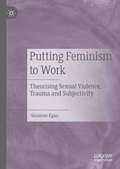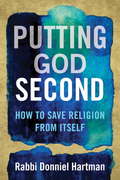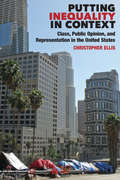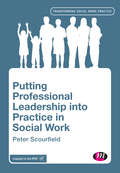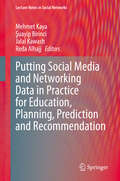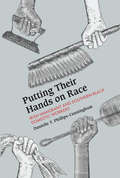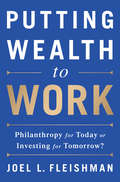- Table View
- List View
Putin Kitsch in America
by Alison RowleyVladimir Putin's image functions as a political talisman far outside of the borders of his own country. Studying material objects, fan fiction, and digital media, Putin Kitsch in America traces the satirical uses of Putin's public persona and how he stands as a foil for other world leaders. Uncovering a wide variety of material culture – satirical, scatological, even risqué – made possible by new print-on-demand technologies, Alison Rowley argues that the internet is crucial to the creation of contemporary Putin memorabilia. She explains that these items are evidence of young people's continued interest and participation in politics, even as some experts decry what they see as the opposite. The book addresses the ways in which explicit sexual references about government officials are used as everyday political commentary in the United States. The number of such references skyrocketed during the 2016 US presidential election campaign, and turning a critical eye to Putin kitsch suggests that the phenomenon will continue when Americans next return to the polls. An examination of how the Russian president's image circulates via memes, parodies, apps, and games, Putin Kitsch in America illustrates how technological change has shaped both the kinds of kitsch being produced and the nature of political engagement today.
Putin Kitsch in America
by Alison RowleyVladimir Putin's image functions as a political talisman far outside of the borders of his own country. Studying material objects, fan fiction, and digital media, Putin Kitsch in America traces the satirical uses of Putin's public persona and how he stands as a foil for other world leaders. Uncovering a wide variety of material culture - satirical, scatological, even risqué - made possible by new print-on-demand technologies, Alison Rowley argues that the internet is crucial to the creation of contemporary Putin memorabilia. She explains that these items are evidence of young people's continued interest and participation in politics, even as some experts decry what they see as the opposite. The book addresses the ways in which explicit sexual references about government officials are used as everyday political commentary in the United States. The number of such references skyrocketed during the 2016 US presidential election campaign, and turning a critical eye to Putin kitsch suggests that the phenomenon will continue when Americans next return to the polls. An examination of how the Russian president's image circulates via memes, parodies, apps, and games, Putin Kitsch in America illustrates how technological change has shaped both the kinds of kitsch being produced and the nature of political engagement today.
Putin as Celebrity and Cultural Icon (BASEES/Routledge Series on Russian and East European Studies)
by Helena GosciloThough in recent months Putin’s popularity has frayed at the edges, the dearth of comparably powerful and experienced political leaders leaves no doubt that he will continue to be a key political figure. During his tenure as Russia’s President and subsequently as Prime Minister, Putin transcended politics, to become the country’s major cultural icon. This book examines the nature of his iconic status. It explores his public persona as glamorous hero, endowed with vision, wisdom, moral and physical strength—the man uniquely capable of restoring Russia’s reputation as a global power. In analysing cultural representations of Putin, the book assesses the role of the media in constructing and disseminating this image and weighs the Russian populace’s contribution to the extraordinary acclamation he enjoyed throughout the first decade of the new millennium, challenged only by a tiny minority.
Putin's Digital Front and the Truth Behind
by Steven BroschartPutin's war in Ukraine is not only fought on the battlefield. Combat also occurs on the digital front. Words and information are the ammunition of modern, hybrid warfare—against the opposing military, but especially against civilians. It is about manipulation and control. About confusion and distraction from what is really happening. However, the internet is used not only for propaganda but also for intelligence and logistics. In doing so, Russia leaves behind a lot of traces. Analyst Steven Broschart demonstrates in clear language that requires no prior knowledge which psychological and communicative means are employed at Putin's digital frontline.
Putin's Fascists: Russkii Obraz and the Politics of Managed Nationalism in Russia (BASEES/Routledge Series on Russian and East European Studies)
by Robert HorvathThis book examines the relationship between the Putin regime and Russkii Obraz, a neo-nazi organization that became a major force on Russia's radical nationalist scene in 2008-10. It shows how Russkii Obraz’s rise was boosted by the regime’s policy of ‘managed nationalism,’ which mobilised radical nationalist proxies against opponents of authoritarianism. In return for undermining moderate nationalists and pro-democracy activists, Russkii Obraz received official support and access to public space. What made this collaboration politically hazardous for the Kremlin was Russkii Obraz's neo-Nazi ideology and its connections to BORN, a terrorist group responsible for a series of high-profile killings. When security forces captured the ringleader of BORN, they precipitated the destruction of Russkii Obraz and a crisis for managed nationalism. Using court records and extensive media and internet sources, this book sheds new light on the complex interaction between the Kremlin, the far-right, and neo-Nazi skinheads during Russia’s descent into authoritarianism.
Putin's Olympics: The Sochi Games and the Evolution of Twenty-First Century Russia (BASEES/Routledge Series on Russian and East European Studies)
by Robert W. Orttung Sufian N. ZhemukhovPresident Vladimir Putin’s Olympic venture put the workings of contemporary Russia on vivid display. The Sochi Olympics were designed to symbolize Russia’s return to great power status, but subsequent aggression against Ukraine, large-scale corruption, and the doping scandal have become the true legacies of the games. The Kremlin’s style of governance through mega-projects has had deleterious consequences for the country’s development. Placing the Sochi games into the larger context of Olympic history, this book examines the political, security, business, ethnic, societal, and international ramifications of Putin’s system.
Putin's Preventive Counter-Revolution: Post-Soviet Authoritarianism and the Spectre of Velvet Revolution (BASEES/Routledge Series on Russian and East European Studies)
by Robert HorvathThis book examines the 'preventive counter-revolution,' a programme of reforms and repression that transformed the face of Russian politics during Vladimir Putin's second term as president. Kremlin propagandists hailed this programme as a defence of national sovereignty against Western attempts to foment a 'velvet revolution' in Russia. But this book shows that the Putin regime was reacting to a real domestic threat: opposition leaders and youth activists who had begun to employ 'velvet' revolutionary methods in a campaign to harness popular grievances and to challenge Putin in the streets and at the ballot box. It traces the formulation and implementation of the regime's two-track response, which was based on a careful analysis of the lessons of the recent 'velvet’ (or ‘coloured’) revolutions in Georgia and Ukraine. The first track was repressive: the imposition of controls on NGOs, restrictions on electoral competition, and a crackdown on opposition demonstrations. The second was the mobilisation of supporters in 'patriotic' youth organisations that employed both gang violence and 'velvet' revolutionary techniques. Drawing on a wide range of Russian-language sources, including opposition activists' blogs, this book charts the end of Russia's experiment with liberal democracy and the emergence of a new type of authoritarian order.
Putin's Third Term as Russia's President, 2012-18 (Routledge Contemporary Russia and Eastern Europe Series)
by Larry BlackThis book provides a comprehensive and systematic overview of Putin’s third term as Russia’s president. It covers political, international relations, economic and social issues, and provides a balanced assessment of Putin’s successes and failures. These include the conflict in Ukraine, the annexation of Crimea, scandals associated with the Olympics, Russia’s increasing involvement with Asia, including with the Shanghai Co-operation Organisation, and shifts in the economy away from huge reliance on energy resources. The book sets Putin’s activities as president in their wider context, discussing his overall popularity, the weakness of potential opposition and the development of the Russian Federation as a relatively new state.
Putin's United Russia Party (BASEES/Routledge Series on Russian and East European Studies)
by S. P. RobertsFrom its inception in 2001, the United Russia Party has rapidly developed into a hugely successful, organisationally-complex political party and key component of power. This book provides a much needed analysis on United Russia by exploring the role of the party in the Russian political system, from 2000 to 2010. It explores the party empirically, as an impressive organisation in its own right, but also theoretically, as an independent or explanatory variable able to illumine the larger development of dominant-power politics in Russia in the same period. The book creates a model to understand the role of political parties in electorally-based political systems and shows how United Russia conforms to this model, and importantly, how the party also has unique features that affect its place in the political system. The book goes on to argue that United Russia represents a ‘virtual’ party hegemony, an outcome of political changes occurring elsewhere, and so a reversal of the typical relationship between parties and power found in comparative literature. This has potentially far reaching implications for our understanding of party dominance in the twenty-first century and also the sources of regime stability and instability.
Putinism – Post-Soviet Russian Regime Ideology (BASEES/Routledge Series on Russian and East European Studies)
by Mikhail SuslovA key question for the contemporary world: What is Putin’s ideology? This book analyses this ideology, which it terms “Putinism”. It examines a range of factors that feed into the ideology – conservative thought in Russia from the nineteenth century onwards, Russian and Soviet history and their memorialisation, Russian Orthodox religion and its political connections, a focus on traditional values, and Russia’s sense of itself as a unique civilisation, different from the West and due a special, respected place in the world. The book highlights that although the resulting ideology lacks coherence and universalism comparable to that of Soviet-era Marxism-Leninism, it is nevertheless effective in aligning the population to the regime and is flexible and applicable in different circumstances. And that therefore it is not attached to Putin as a person, is likely to outlive him, and is potentially appealing elsewhere in the world outside Russia, especially to countries that feel belittled by the West and let down by the West’s failure to resolve problems of global injustice and inequality.
Putins digitale Front und die Wahrheit dahinter
by Steven BroschartPutins Krieg in der Ukraine wird nicht nur auf dem Schlachtfeld ausgetragen. Gekämpft wird auch an der digitalen Front. Worte und Informationen sind die Munition der modernen, der hybriden Kriegsführung - gegen das gegnerische Militär, aber insbesondere gegen Zivilisten. Es geht um Manipulation und Kontrolle. Um Verwirrung und Ablenkung von dem, was wirklich geschieht. Doch das Internet wird nicht nur zur Propaganda, sondern auch für die Aufklärung und die Logistik genutzt. Und dabei hinterlässt Russland eine Menge Spuren. Analyst Steven Broschart zeigt konkret, welche psychologischen und kommunikativen Mittel an Putins digitaler Frontlinie zum Einsatz kommen.
Putting Analysis Into Child and Family Assessment, Third Edition: Undertaking Assessments of Need
by Donald Forrester Sheryl Burton Emma Sawyer Ruth DalzellPutting Analysis into Child and Family Assessment bridges theory and practice, and provides clear guidance to improve assessments in child and family social work. It addresses the issues of central concern to child and family social workers, including analytical assessment, outlines how to avoid common pitfalls, provides strong theoretical foundations, and demonstrates how the theory can be translated into practice. With reference to common and specialist assessments, the book covers every stage of the assessment process: planning and preparation, hypothesising, involving children, and making, recording and reviewing decisions. It features practice tools, case studies and practice development sessions and activities. This third edition has been fully updated with recent policy changes and new research findings. This book will be valued by practitioners, managers, trainers and lecturers looking for a grounded resource which provides practical guidance on how to improve assessments.
Putting Children First: How Low-Wage Working Mothers Manage Child Care
by Ajay ChaudryIn the five years following the passage of federal welfare reform law, the labor force participation of low-income, single mothers with young children climbed by more than 25 percent. With significantly more hours spent outside the home, single working mothers face a serious childcare crunch—how can they provide quality care for their children? In Putting Children First, Ajay Chaudry follows 42 low-income families in New York City over three years to illuminate the plight of these mothers and the ways in which they respond to the difficult challenge of providing for their children's material and developmental needs with limited resources. Using the words of the women themselves, Chaudry tells a startling story. Scarce subsidies, complicated bureaucracies, inflexible work schedules, and limited choices force families to piece together care arrangements that are often unstable, unreliable, inconvenient, and of limited quality. Because their wages are so low, these women are forced to rely on inexpensive caregivers who are often under-qualified to serve the developmental needs of their children. Even when these mothers find good, affordable care, it rarely lasts long because their volatile employment situations throw their needs into constant flux. The average woman in Chaudry's sample had to find five different primary caregivers in her child's first four years, while over a quarter of them needed seven or more in that time. This book lets single, low-income mothers describe the childcare arrangements they desire and the ways that options available to them fail to meet even their most basic needs. As Chaudry tracks these women through erratic childcare spells, he reveals the strategies they employ, the tremendous costs they incur and the anxiety they face when trying to ensure that their children are given proper care. Honest, powerful, and alarming, Putting Children First gives a fresh perspective on work and family for the disadvantaged. It infuses a human voice into the ongoing debate about the effectiveness of welfare reform, showing the flaws of a social policy based solely on personal responsibility without concurrent societal responsibility, and suggesting a better path for the future.
Putting Children First: New Frontiers in the Fight Against Child Poverty in Africa (CROP International Poverty Studies #7)
by Keetie RoelenDespite important strides in the fight against poverty in the past two decades, child poverty remains widespread and persistent, particularly in Africa. Poverty in all its dimensions is detrimental for early childhood development and leads to often unreversed damage for the lives of girls and boys, locking children and families into intergenerational poverty. This edited volume contributes to the policy initiatives aiming to reduce child poverty and academic understanding of child poverty and its solutions by bringing together applied research from across the continent. With the Sustainable Development Goals having opened up an important space for the fight against child poverty, not least by broadening its conceptualization to be multidimensional, this collection aims to push the frontiers by challenging existing narratives around child poverty, exploring alternative understandings of the complexities and dynamics underpinning child poverty and, crucially, examining policy options that work to reduce child poverty.
Putting Children’s Interests First in U.S. Family Law and Policy: With Power Comes Responsibility
by Helen M. AlvaréThe well-being of children should be a social priority, and should consider the family circumstances into which children are born. Putting Children's Interests First in US Family Law and Policy: With Power Comes Responsibility details the rise of a federal policy of 'sexual expressionism', which prioritizes adults' interests over children's welfare. It describes the costs to children in the areas of family structure and stability, and the federal programs attempting to ameliorate the situation of non-marital children. Offering a detailed empirical and ethical critique both of 'sexual expressionism' and of the related federal programs, this study will be of interest to scholars and activists supporting children, women and the poor.
Putting Faith in Partnerships: Welfare-to-Work in Four Cities
by Stephen V. MonsmaPutting Faith in Partnerships addresses a major conceptual change in American domestic policy, begun by Reagan and now fully realized by the Bush administration: the shift of responsibility for social services from the federal government to states and communities. In this groundbreaking study of a politically controversial topic---the debut offering in Alan Wolfe's Contemporary Political and Social Issues series---author Stephen Monsma avoids overheated rhetoric in favor of a careful, critical analysis of the hard evidence on whether public-private partnerships really work. The book is based on in-depth studies of social service programs in Los Angeles, Chicago, Philadelphia, and Dallas. By examining public-private partnerships between government offices and nonprofit organizations, Monsma seeks to understand how these partnerships affect the balance between government's efforts to deal with social problems and the rights of individual citizens to control their own lives.
Putting Fear of Crime on the Map
by Melissa B. Burgess Bruce J. DoranSince first emerging as an issue of concern in the late 1960s, fear of crime has become one of the most researched topics in contemporary criminology and receives considerable attention in a range of other disciplines including social ecology, social psychology and geography. Researchers looking the subject have consistently uncovered alarming characteristics, primarily relating to the behavioural responses that people adopt in relation to their fear of crime. This book reports on research conducted over the past eight years, in which efforts have been made to pioneer the combination of techniques from behavioural geography with Geographic Information Systems (GIS) in order to map the fear of crime. The first part of the book outlines the history of research into fear of crime, with an emphasis on the many approaches that have been used to investigate the problem and the need for a spatially-explicit approach. The second part provides a technical break down of the GIS-based techniques used to map fear of crime and summarises key findings from two separate study sites. The authors describe collective avoidance behaviour in relation to disorder decline models such as the Broken Windows Thesis, the potential to integrate fear mapping with police-community partnerships and emerging avenues for further research. Issues discussed include fear of crime in relation to housing prices and disorder, the use of fear mapping as a means with which to monitor the impact of Closed Circuit Television (CCTV) and fear mapping in transit environments.
Putting Feminism to Work: Theorising Sexual Violence, Trauma and Subjectivity
by Suzanne EganThis book explores the place of feminism and uptake of trauma in contemporary work against sexual violence. Egan presents a refreshing alternative position on arguments about the co-optation or erasure of feminism within institutionalized, professionalized services for sexual assault victims. Using original research on Australian sexual assault services, Putting Feminism to Work effectively illustrates how feminist concepts and ideas have become routinized in contemporary services and enacted in daily practices with survivors and communities. The book engages with, yet resists, the notion that feminist engagement with knowledge (trauma) based in psychiatry and clinical psychology is incompatible with feminism or inevitably reduces sexual violence to a problem of individual healing. Indeed Egan argues that the productive ways practitioners integrate neurobiological understandings of trauma into their work suggests rich possibilities for reintroducing a non-essentialist biology of the body into feminist theories of sexual violence. Scholars, students and practitioners working in the fields of violence against women, sociology, women’s and gender studies, health, social work and policy studies, as well as the emerging field of sociologically informed trauma studies, will find this book of interest.
Putting God Second
by Donniel HartmanWhy have the monotheistic religions failed to produce societies that live up to their ethical ideals? A prominent rabbi answers this question by looking at his own faith and offering a way for religion to heal itself.In Putting God Second, Rabbi Donniel Hartman tackles one of modern life's most urgent and vexing questions: Why are the great monotheistic faiths--Judaism, Christianity, and Islam--chronically unable to fulfill their own self-professed goal of creating individuals infused with moral sensitivity and societies governed by the highest ethical standards?To answer this question, Hartman takes a sober look at the moral peaks and valleys of his own tradition, Judaism, and diagnoses it with clarity, creativity, and erudition. He rejects both the sweeping denouncements of those who view religion as an inherent impediment to moral progress and the apologetics of fundamentalists who proclaim religion's moral perfection against all evidence to the contrary.Hartman identifies the primary source of religion's moral failure in what he terms its "autoimmune disease," or the way religions so often undermine their own deepest values. While God obligates the good and calls us into its service, Hartman argues, God simultaneously and inadvertently makes us morally blind. The nature of this self-defeating condition is that the human religious desire to live in relationship with God often distracts religious believers from their traditions' core moral truths.The answer Hartman offers is this: put God second. In order to fulfill religion's true vision for humanity--an uncompromising focus on the ethical treatment of others--religious believers must hold their traditions accountable to the highest independent moral standards. Decency toward one's neighbor must always take precedence over acts of religious devotion, and ethical piety must trump ritual piety. For as long as devotion to God comes first, responsibility to other people will trail far, far behind.In this book, Judaism serves as a template for how the challenge might be addressed by those of other faiths, whose sacred scriptures similarly evoke both the sublime heights of human aspiration and the depths of narcissistic moral blindness. In Putting God Second, Rabbi Hartman offers a lucid analysis of religion's flaws, as well as a compelling resource, and vision, for its repair.From the Hardcover edition.
Putting Inequality in Context: Class, Public Opinion, and Representation in the United States
by Christopher EllisRising income inequality is highlighted as one of the largest challenges facing the United States, affecting civic participation and political representation. Although the wealthy often can and do exert more political influence, this is not always the case. To fix political inequality, it is important to understand exactly how class divisions manifest themselves in political outcomes, and what factors serve to enhance, or depress, inequalities in political voice. Christopher Ellis argues citizens’—and legislators’—views of class politics are driven by lived experience in particular communities. While some experience is formally political, on an informal basis citizens learn a great deal about their position in the broader socioeconomic spectrum and the social norms governing how class intersects with day-to-day life. These factors are important for policymakers, since most legislators do not represent “the public” at large, but specific constituencies. Focusing on U.S. congressional districts as the contextual unit of interest, Ellis argues individuals’ political behavior cannot be separated from their environment, and shows how income’s role in political processes is affected by the contexts in which citizens and legislators interact. Political inequality exists in the aggregate, but it does not exist everywhere. It is, rather, a function of specific arrangements that depress the political influence of the poor. Identifying and understanding these factors is a crucial step in thinking about what reforms might be especially helpful in enhancing equality of political voice.
Putting Professional Leadership into Practice in Social Work (Transforming Social Work Practice Series)
by Peter ScourfieldThe ability to demonstrate professional leadership is a core requirement for social work students and social workers operating at all levels. This comprehensive textbook is ideal for any student on a social work course, from undergraduate to postgraduate study, and will go onto serve as a useful reference for more experienced social work professionals. this book engages in the essential discussion of what professional leadership means in the context of contemporary social work and why this is considered to be important for the future of the profession. Each chapter contains illustrative case studies, a range of interactive activities, a summary of key point and suggestions for further reading that enable students and qualified social workers to understand the knowledge, skills and attributes required in practicing professional leadership in real life contexts.
Putting Professional Leadership into Practice in Social Work (Transforming Social Work Practice Series)
by Peter ScourfieldThe ability to demonstrate professional leadership is a core requirement for social work students and social workers operating at all levels. This comprehensive textbook is ideal for any student on a social work course, from undergraduate to postgraduate study, and will go onto serve as a useful reference for more experienced social work professionals. this book engages in the essential discussion of what professional leadership means in the context of contemporary social work and why this is considered to be important for the future of the profession. Each chapter contains illustrative case studies, a range of interactive activities, a summary of key point and suggestions for further reading that enable students and qualified social workers to understand the knowledge, skills and attributes required in practicing professional leadership in real life contexts.
Putting Social Media and Networking Data in Practice for Education, Planning, Prediction and Recommendation (Lecture Notes in Social Networks)
by Jalal Kawash Reda Alhajj Mehmet Kaya Şuayip BirinciThis book focusses on recommendation, behavior, and anomaly, among of social media analysis. First, recommendation is vital for a variety of applications to narrow down the search space and to better guide people towards educated and personalized alternatives. In this context, the book covers supporting students, food venue, friend and paper recommendation to demonstrate the power of social media data analysis. Secondly, this book treats behavior analysis and understanding as important for a variety of applications, including inspiring behavior from discussion platforms, determining user choices, detecting following patterns, crowd behavior modeling for emergency evacuation, tracking community structure, etc. Third, fraud and anomaly detection have been well tackled based on social media analysis. This has is illustrated in this book by identifying anomalous nodes in a network, chasing undetected fraud processes, discovering hidden knowledge, detecting clickbait, etc. With this wide coverage, the book forms a good source for practitioners and researchers, including instructors and students.
Putting Their Hands on Race: Irish Immigrant and Southern Black Domestic Workers
by Danielle T. Phillips-CunninghamWinner of the 2020 Sarah A. Whaley Book Prize from the National Women's Studies Association Putting Their Hands on Race offers an important labor history of 19th and early 20th century Irish immigrant and US southern Black migrant domestic workers. Drawing on a range of archival sources, this intersectional study explores how these women were significant to the racial labor and citizenship politics of their time. Their migrations to northeastern cities challenged racial hierarchies and formations. Southern Black migrant women resisted the gendered racism of domestic service, and Irish immigrant women strove to expand whiteness to position themselves as deserving of labor rights. On the racially fractious terrain of labor, Black women and Irish immigrant women, including Victoria Earle Matthews, the “Irish Rambler”, Leonora Barry, and Anna Julia Cooper, gathered data, wrote letters and speeches, marched, protested, engaged in private acts of resistance in the workplace, and created women’s institutions and organizations to assert domestic workers’ right to living wages and protection.
Putting Wealth to Work: Philanthropy for Today or Investing for Tomorrow?
by Joel L. FleishmanBy 2025, Americans will likely be donating over half a trillion dollars annually to nonprofit organizations. Those philanthropic gifts will transform significant parts of America's civic sector landscape.Philanthropy is entering an era of unprecedented growth and innovation. Established foundations such as Ford and Rockefeller are doubling down on programs tackling long-simmering problems, including global inequality, less-than-stellar education, and uneven access to health care. Many foundations are engaging in advocacy on controversial issues, exploring venture philanthropy solutions, and experimenting with impact investing. And philanthropists such as Bill Gates, Warren Buffett, New York's high-profile financiers, and Silicon Valley's billionaires are planning to put their wealth to work as never before: Mark Zuckerberg and Priscilla Chan recently pledged to donate 99 percent of their Facebook shares during their lifetimes, and nearly 150 others have signed the Giving Pledge to increase dramatically their "giving while living."In Putting Wealth to Work, Joel L. Fleishman provides expert analysis of contemporary philanthropy, offering invaluable insight for those engaging with and affected by charitable foundations. This is the fascinating and definitive account of philanthropy today, and an indispensable guide to understanding its inner workings, impact, and expansive potential.
